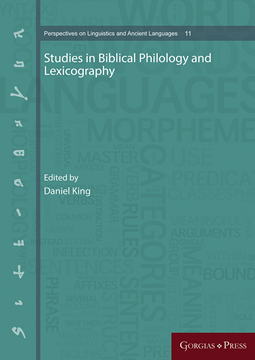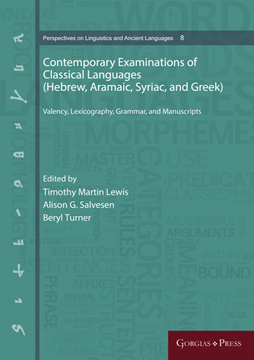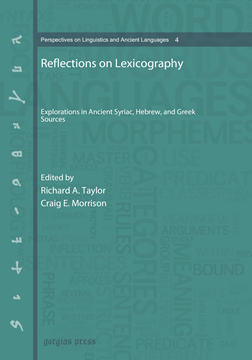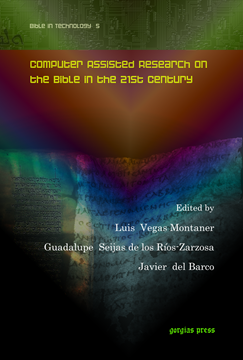Janet Dyk
Studies in Biblical Philology and Lexicography
Edited by Daniel King
ISBN: 978-1-4632-4035-6
This volume offers papers that emerged from the meeting of the International Syriac Language Project (ISLP) which took place at Stellenbosch University, South Africa, in September 2016, and at the Humboldt-Universität zu Berlin, in August 2017. The ISLP invites research not only into Syriac, but extends its range to all ancient language lexicography. Hence its proceedings enrich the whole field of Syriac, Hebrew, and Greek lexicography. The ISLP especially encourages research into the interfaces between these languages, and hence the current volume contains a number of papers on translation equivalence: Hebrew-Greek, Hebrew-Syriac, and Greek-Syriac. Other philologically focused pieces explore matters relating to textual and manuscript traditions. All of these are preceded in the present volume by an extensive review of the production and achievements of the ISLP to date.
$149.00 (USD) $89.40 (USD)
Contemporary Examinations of Classical Languages (Hebrew, Aramaic, Syriac, and Greek)
Valency, Lexicography, Grammar, and Manuscripts
ISBN: 978-1-4632-0656-7
Ancient language study is becoming an increasingly sophisticated and complex discipline, as scholars not only consider methods being used by specialists of other languages, but also absorb developments in other disciplines to facilitate their own research investigations. This interdisciplinary approach is reflected in the scope of research papers offered here, invited and peer-reviewed by the ISLP.
$153.00 (USD) $91.80 (USD)
Reflections on Lexicography
Explorations in Ancient Syriac, Hebrew, and Greek Sources
Edited by Richard A. Taylor & Craig E. Morrison
ISBN: 978-1-4632-0229-3
Colloquia of the International Syriac Language Project. These essays offer a probing analysis of selected lexical tools and methods for working with ancient Syriac, Hebrew, and Greek sources, as well as offering reflections on methodological concerns for lexicographical tools of the future.
$183.00 (USD) $109.80 (USD)
Foundations for Syriac Lexicography V
Colloquia of the International Syriac Language Project
Edited by Jonathan Loopstra & Michael Sokoloff
Series: Perspectives on Syriac Linguistics 7
ISBN: 978-1-61719-027-8
The fifth published colloquia of the International Syriac Language Project (ISLP), presenting papers from an international team of authors working to develop contemporary, interdisciplinary approaches to linguistics and lexicography.
$165.00 (USD) $99.00 (USD)
Computer Assisted Research on the Bible in the 21st Century
ISBN: 978-1-60724-930-6
The application of computer technology to the edition and linguistic analysis of biblical texts has provided, in the last thirty years, advanced tools for research purposes as well as for teaching the Bible in the classroom. This discipline requires, nonetheless, a critical evaluation from a historical perspective, examining past and present achievements and failures. This collection of essays evaluates the current tools and considers what is needed to satisfy the increasing demand for software related to the biblical texts, and offers an overview of different trends in computer technology on the Bible.
$145.00 (USD) $87.00 (USD)
Foundations for Syriac Lexicography II
Colloquia of the International Syriac Language Project
Edited by P. J. Williams; Managing Editor Beryl Turner
Series: Perspectives on Syriac Linguistics 3
ISBN: 978-1-60724-088-4
This volume is part of a series that addresses issues of Classical Syriac lexicography, and the lexicography of other ancient languages. The international team of authors invited to participate represents a wide range of disciplines and opens new horizons in lexical thinking. Essays in this volume discuss taxonomy, the Syriac passive participle, translating Greek verbs with alpha privatives into Syriac, the translation of Syriac particles, and the history of Syriac lexica. This book represents the forefront of Syriac lexical studies, and has much to offer those studying Greek and other Semitic languages as well.
$138.00 (USD) $82.80 (USD)
Foundations for Syriac Lexicography III
Colloquia of the International Syriac Language Project
Series: Perspectives on Syriac Linguistics 4
ISBN: 978-1-60724-072-3
This volume is part of a series that addresses issues of Classical Syriac lexicography, and the lexicography of other ancient languages. The international team of authors invited to participate represents a wide range of disciplines and opens new horizons in lexical thinking. Essays in this volume discuss the place for enclitics in lexica, the grammatical classification of words, translation technique, and using new technologies to aid in the lexicographer’s task. This book represents the forefront of Syriac lexical studies, and has much to offer those studying Greek and other Semitic languages as well.
$166.00 (USD) $99.60 (USD)







